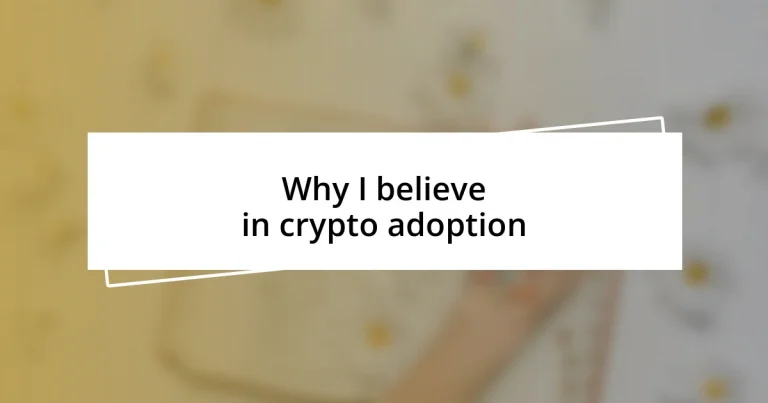Key takeaways:
- Cryptocurrency operates on blockchain technology, enabling secure, decentralized transactions and empowering individuals with control over their wealth.
- The rise of digital currencies is transforming perceptions of finance, offering accessibility, lower transaction fees, and opportunities for financial inclusion globally.
- Addressing misconceptions about crypto reveals its potential for long-term growth and societal impact, from local business innovations to enhancing public services through digital identities.

Understanding cryptocurrency basics
Cryptocurrency may feel overwhelming at first, but at its core, it’s simply a digital form of currency that operates on technology called blockchain. When I first encountered Bitcoin, I was confused but simultaneously intrigued; the idea that I could send money without a bank was revolutionary. It really got me thinking—what if this could change the way we perceive and use money entirely?
At its essence, blockchain is like a digital ledger that securely records transactions across many computers. It’s fascinating how the decentralized nature of this technology means no single authority controls it. I remember my first transaction; the thrill I felt when I realized that I was part of this innovative system, unbounded by traditional financial institutions, was exhilarating.
To put it simply, owning cryptocurrency is about possessing a unique digital token that can be exchanged for goods, services, or even other currencies. Have you ever thought about how impactful it is to have a financial asset that’s not subject to inflation in the same way fiat currencies are? The notion that individuals have control over their own wealth aligns perfectly with a growing desire for empowerment in our financial lives.
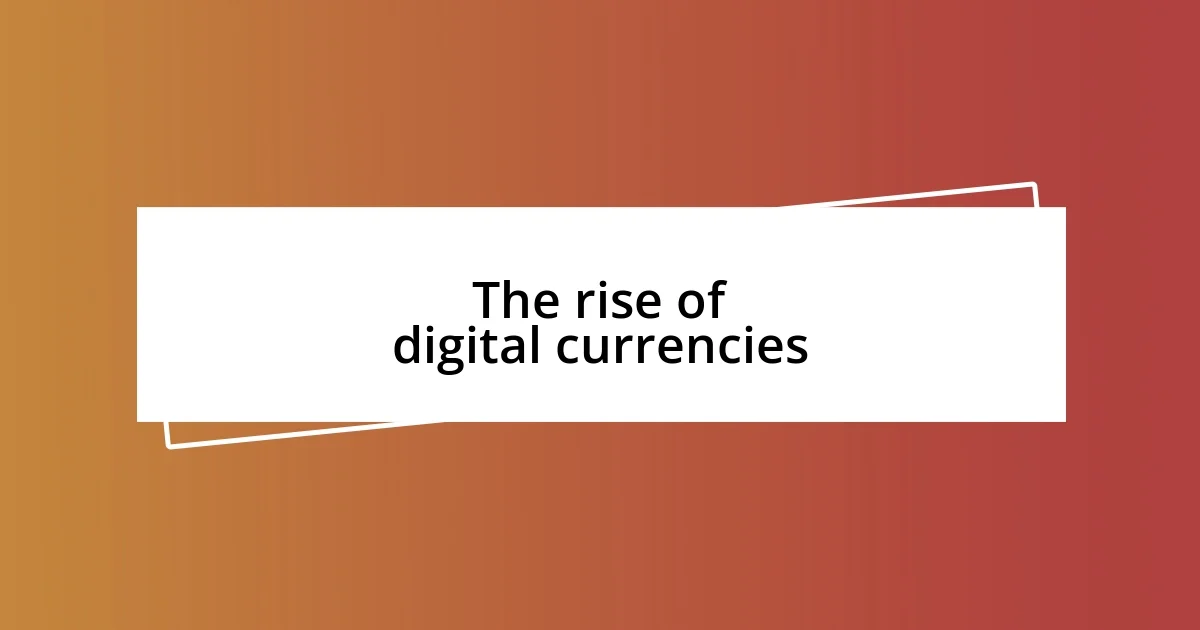
The rise of digital currencies
As I reflect on the emergence of digital currencies, I can’t help but feel a sense of excitement. Over the past decade, we’ve seen cryptocurrencies evolve from a niche interest to a global phenomenon. It’s incredible how people are beginning to see crypto as not just a speculative asset, but a viable alternative to traditional money, enabling financial transactions without the constraints imposed by banks.
When I first started investing in Ethereum, I was struck by how widespread the use of digital currencies was becoming. From cafes accepting Bitcoin to entire nations exploring Central Bank Digital Currencies (CBDCs), this movement is no longer confined to tech enthusiasts. There’s a palpable shift in the air—a growing acknowledgment that digital currencies have the power to redefine our financial landscape.
It’s also remarkable how the rise of digital currencies has sparked discussions around decentralization, financial inclusion, and privacy. I vividly remember chatting with a friend in a developing country who shared how cryptocurrency was providing him with access to financial services he had never had before. That conversation opened my eyes to the profound impact of digital currencies in bridging gaps in financial access worldwide.
| Traditional Currency | Digital Currency |
|---|---|
| Centralized control | Decentralized network |
| Bank-dependent transactions | Peer-to-peer transactions |
| Limited accessibility | Global access |
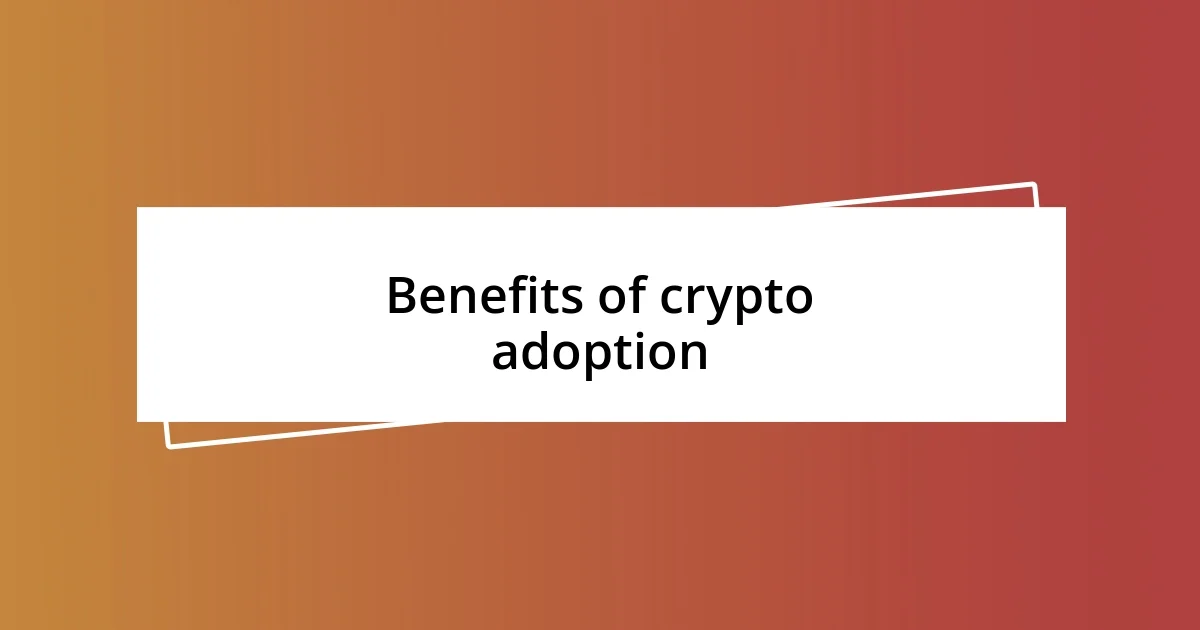
Benefits of crypto adoption
Adopting cryptocurrency offers a plethora of benefits that can transform our financial lives. One of the most significant advantages I’ve come to appreciate is the speed of transactions. I vividly recall a time when I was traveling abroad and needed to send money to a friend at home. Using traditional methods was a hassle—long wait times and high fees made the process frustrating. However, sending crypto took mere minutes, and the transaction fees were negligible. It’s a world where financial freedom meets convenience.
Here are some key benefits of crypto adoption:
- Lower transaction fees: Crypto transactions often cost less than traditional bank transactions or wire transfers.
- Accessibility: Crypto provides banking services to unbanked populations, opening up opportunities for many worldwide.
- Transparency: Every transaction on the blockchain is recorded and verifiable, fostering trust.
- Security: The decentralized nature of cryptocurrencies helps protect against fraud and hacking.
- Potential for growth: As adoption increases, so does the potential for value appreciation in many cryptocurrencies.
In addition, there’s something surprisingly empowering about having control over one’s finances. When I made my first investment in a cryptocurrency project, I felt a sense of ownership that I hadn’t experienced in traditional banking. It wasn’t just about making money; it was about being part of a community that values innovation and inclusion. I realized that with crypto, I wasn’t merely a consumer; I was an active participant in shaping the future of finance. That realization has truly motivated me to advocate for broader crypto adoption.

Real life use cases
When I think about real-life use cases of cryptocurrency, one story stands out. A friend of mine runs a small business importing goods from overseas. He was fed up with the delays and fees associated with traditional international transfers. After integrating Bitcoin payments into his business, he found that he could complete transactions almost instantly. The relief on his face was priceless—it was as if a burden had been lifted. How many small business owners could benefit from this kind of efficiency?
Then there’s the inspiring case of microloans in developing regions. I remember reading about a non-profit organization that used blockchain technology to provide small loans to farmers in places where banking services were virtually nonexistent. With the help of smart contracts, funds were distributed transparently, and repayment was tracked seamlessly. It left me wondering: how does it feel for someone to plant seeds for their future without the limitations of traditional banking? It’s nothing short of revolutionary.
It’s not just about convenience; it’s about empowerment and community. I recall attending a charity event where donations were accepted in various cryptocurrencies. The instant verification of contributions created a tangible connection between donors and beneficiaries. Everyone could see the impact of their generosity in real-time. Witnessing that dynamic fostered a sense of unity that traditional donation methods often lack. Can you imagine being part of something so immediate and impactful? That’s exactly what crypto can offer—an avenue for social change that feels personal and profound.
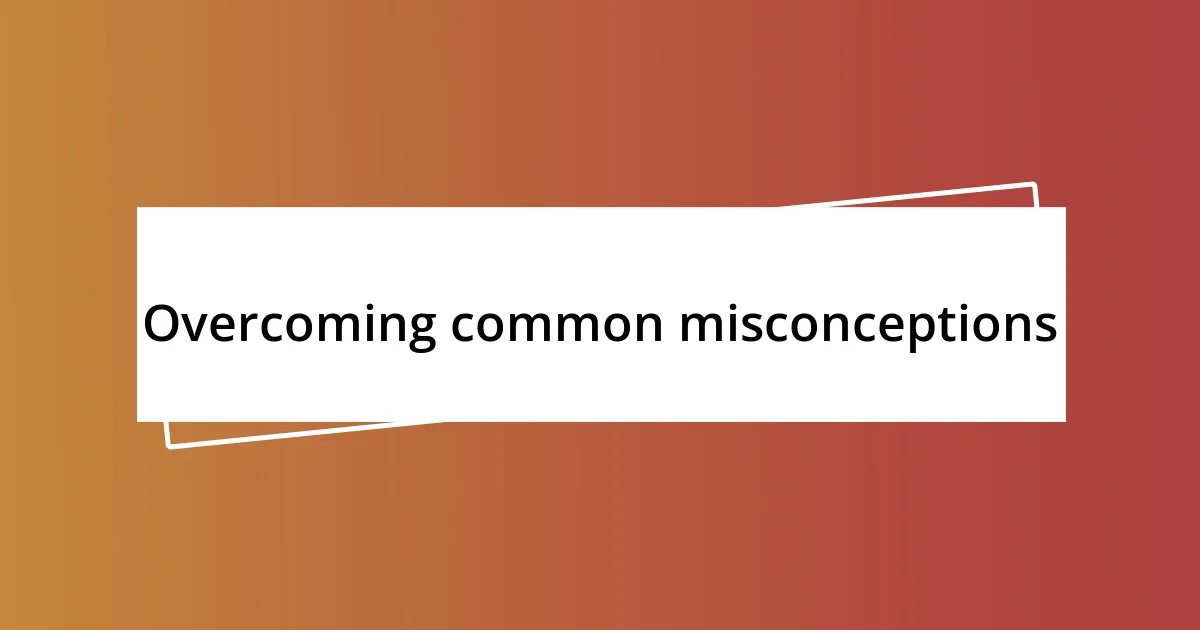
Overcoming common misconceptions
Many people think cryptocurrencies are just for tech-savvy individuals or that they’re a passing trend. I remember when my own family reacted skeptically to my interest in crypto. But as I described how accessible it is for anyone with a smartphone, I saw their hesitation fade. It dawned on me just how misinformed we can be about emerging technologies that are making significant strides globally.
Another misconception is that crypto is only for illicit activities. I can’t recall how many times I’ve heard that argument in discussions! Yes, there are bad actors, but that’s true for every financial system. The blockchain technology behind crypto actually offers a higher level of transparency and traceability than many traditional systems. When I learned about how it’s being used to combat fraud, it made me rethink the narrative entirely. Isn’t it interesting how easily narratives can shift once you dive deeper?
There’s this myth that cryptocurrencies are extremely volatile and too risky for the average investor. Sure, I’ve witnessed market fluctuations that took my breath away, but I’ve also seen the market stabilize as more people adopt and understand it. I often ask myself: what change doesn’t come with some level of risk? My friend, who initially shied away due to volatility, recently diversified into crypto, realizing its potential for long-term growth. It’s remarkable how overcoming these misconceptions can open doors to new opportunities. What might you be missing if you let misconceptions hold you back?
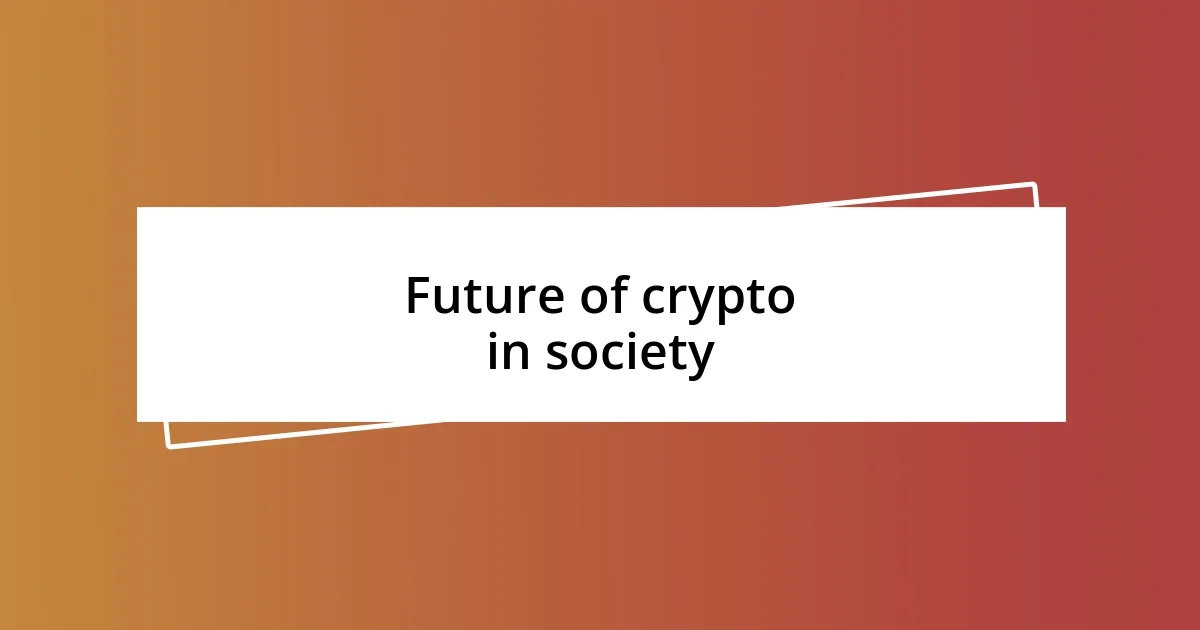
Future of crypto in society
The future of cryptocurrency in our society looks increasingly promising. I recently read about a local café that introduced a loyalty program using crypto rewards. Customers earn tokens through purchases, which they can then use to redeem discounts or special offers. Imagine the excitement of being rewarded for enjoying your favorite coffee! It’s community engagement at its finest, and I can’t help but wonder how this could transform the way we interact with local businesses.
As I think about the potential for wider adoption, I reflect on my own experiences discussing crypto with friends who initially felt overwhelmed. It’s fascinating how knowledge is power; once we dive into the basics together, they often see the transformative possibilities for everything from remittances to everyday transactions. Can you picture a world where sending money across borders takes mere seconds without hefty fees? That’s the kind of convenience that could genuinely reshape how we spend, save, and support one another.
I see a vivid future where cryptocurrencies evolve beyond mere investment vehicles into integral parts of our daily lives. Just recently, I attended a workshop focused on integrating crypto into public services. Hearing about digital identities on the blockchain that can simplify voting and healthcare access was eye-opening. It raises the question: how can we harness such technology to ensure equality and inclusion within our communities? The thrill lies in knowing we’re just scratching the surface of what’s possible.












